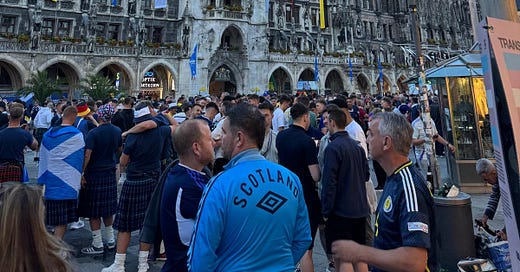The Marienplatz diaries: Fergie, Fletch, Nevin and me
Henry Winter is the England team's most celebrated chronicler, but his history with Scotland once again drew him to the Tartan Army on the eve of a major tournament
Our guest writer today is the great Henry Winter. If you enjoy reading about football - and let’s face it, you do - you will know Henry as one of the very best in the business. The former chief football writer of The Times, he now has his own Substack - check it out here. Now, over to Henry.
You always know a travelling support is being well-received when locals ask for selfies. They want a souvenir of the moment a special party rolled into town, as happened when the Tartan Army took over Munich the night before Scotland played Germany at Euro 2024 on June 14. Scotland fans turned up in Munich more than the players did.
I was heading to an event across the city and went through the historic main square, Marienplatz, which was thronged with many of the estimated 150,000 Scots in Munich. Four policemen strolled around, totally redundant. A large conga snaked through the crowd, singing “We’re the famous Tartan Army and we’re off to Germany”. Movement was slightly restricted for others as they had crates of Lowenbrau at their feet. “No Scotland, No Party” was an individual T-shirt logo and a collective mission statement for all involved.
It reminded me of the start of France 98 when Paris was taken over by Scots before the Brazil game. I ended up at 4am outside a brasserie near the Champs Elysees with a group of Scots watching a fireman climb a ladder to a burning flat, which turned out to be a brothel, and descend with a scantily clad lady over his shoulder. Fortunately, she was fine, only her look was smouldering, and the Scottish fans applauded the rescuer and the rescued.
Elsewhere in Paris that night the Scottish entrepreneur and accomplished photographer, David Yarrow, was hosting a party in the Buddha Bar where Alex Ferguson wore a Viking helmet, Sean Connery danced, and Ally McCoist belted out Bruce Springsteen numbers. With a backing duo of Kenny Dalglish and Ewan McGregor.
The Scots know how to party. Yarrow, who was my sports photographer on The Student paper at Edinburgh, decided to repeat Paris in Munich. So I arrived at “A Scottish Night in Bavaria” and immediately ran into a beaming Bryan Gunn, holding court about Aberdeen, Norwich and Scotland. Pat Nevin had a microphone, and was interviewing all and sundry for BBC Scotland. Is there anything Nevin can’t do? Footballer, chief executive, pundit, presenter, writer, DJ, and one of the most engaging individuals you can meet, passionate on a range of subjects. After chatting to Pat, I went in search of McCoist, partly to find out how AC/DC had been the night before. Inevitably, McCoist was up on stage.
Over at the bar, I’ve not seen such prodigious, industrial consumption of beer since the Edinburgh University Association Football Club beer-drinking competition in 1981 to raise funds for the club. Sponsor me to drink beer with football friends; my parents kindly chipped in, shrugging that they had been doing that for years anyway. Three hours in the club pavilion at Peffermill, chuck up and you get chucked out, last man standing or staggering wins. The winner, a Dundee United fan and a decent defender, was still standing after 22 pints. In three hours. Astonishing. Determined to impress as the only Englishman in the club, I came third with 12 pints but pre-match tactics of lining the stomach with milk and spaghetti inflicted an undignified later defeat.
It was good to see old uni friends in Munich like Yarrow, who was raising funds for Street Soccer Scotland. I think they made £100,000 on the night, money which will change lives in Glasgow.
Here was the Scotland football family helping out. Super John McGinn and Andy Robertson sent signed shirts and boots. Ferguson was present, and I weaved through the tables to shake hands and exchange a few brief words. There are not many people in football I respect as much, probably only Dalglish.
I admire the pair not only for their footballing achievements but for the way they live their lives, their principles, their resilience and their humanity. Of the phone calls I remember most, a two-minute conversation with Ferguson in 1995 will always remain with me. I asked him for some words for the foreword for Kenny’s book I was writing and he spoke powerfully, eloquently and insightfully on Kenny the player, the manager and the man, and then put the phone down. Absolute gold dust. I’ve not met many people who speak with such flow, depth of vocabulary and expert grammar as Ferguson. No wonder Harvard loves him. He rang me last year and after the call I noticed I’d instinctively stood on hearing his voice. Not awe, just respect.
Anyway, Ferguson was at Yarrow’s bash, as was Alex McLeish, always great value in an interview or simple discussion. As I rewound from the tables, I saw Darren Fletcher. I never really had much contact with him during his playing days but found him such an intelligent talker as coach and technical director at Manchester United. Even in a noisy room with bagpipes still as piping hot as the food, Fletcher engaged in a measured debate about Scotland’s chances the next night. He’s the type of ex-player the Scottish FA could do with focusing on player development.
Leaving the party, and leaving behind all these fine Scottish minds from Ferguson to Fletcher via Nevin, and all the merry rest, I’m reminded why Scotland has produced so many great managers and pundits. The passion for the sport, and desire to debate it, runs through the country like granite.
I make my way back through Marienplatz and spot a “Remember Bannockburn” flag. I have one at home, picked up on the way back from Mount Florida after England played at Hampden in 1984, much to the bemusement of an elderly relative when I returned to London. “But darling, didn’t we lose?’’ No, 1-1, Tony Woodcock equalised. The flag came in handy as the backdrop to a Zoom call when I was discussing doing a book with Duncan Ferguson. He enjoyed the Bannockburn image, not least because he had attended Bannockburn High School in Stirling.
Waving their banners, the thousands of members of the Tartan Army were still singing and dancing, the four coppers still wandering around, redundant, and the Bavarians still taking pictures of when Scotland came to town.







The relationship between Ferguson and Dalglish has always been fascinating, the mutual respect, the shared heritage, their fierce loyalty to anyone that happens to fall under their shelter and the white hot intensity of their rivalries stemming from Old Firm to the North-West Derby.